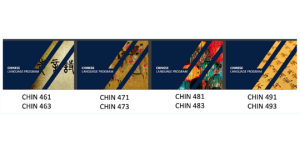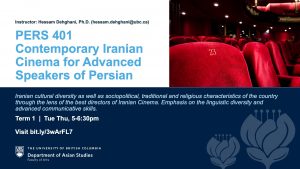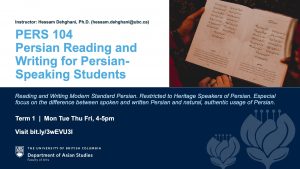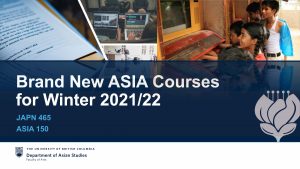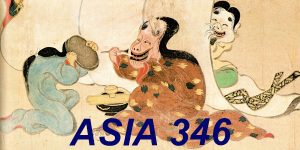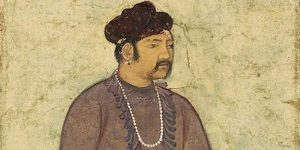Templating Chinese Literature: The TLEF Template Project for Chinese Literature Courses at the Chinese Language Program
Dr. Xiaowen Xu and her team designed eight Canvas templates for the literature courses in the Chinese Language Program.
Bridging Gaps: Promoting Differentiated Instruction for Both Heritage and Non-Heritage Mandarin Learners in CHIN244/338
Heritage Mandarin learners are frequently faced with particular challenges such as identity confusion, language barriers, doubled sense of cultural alienation, and so on. These difficulties often arise from the ambiguous cultural spaces they are situated in and their shared diasporic experiences. This has precisely been how Selina Guo, a third-year Political Science student, felt when she grew up in […]
Persian 401 Contemporary Iranian Cinema for Advanced Speakers of Persian
This course will explore contemporary Iranian cinema and its relation with Iranian culture.
PERS 104 Persian Reading and Writing for Persian-Speaking Students
This non-intensive Persian course is designed for heritage students whose level of speaking and listening skills is intermediate but have minimum or no reading and writing ability.
PERS 100 Basic Persian I
This non-intensive Persian course is for non-heritage students with no prior knowledge of language (zero beginner) and culture.
Brand New ASIA Courses for Winter 2021/22 | UBC Asian Studies
ASIA 150: Asian Internets & JAPN 465: Japanese Media and Translation
KORN 302 student Won the Grand Prize at the 15th annual Toronto Korean Speech Contest
On March 20, 2021, Eric Venis, who is currently taking Korean 302, won the Grand Prize for his speech “뭘 먹을까요? What shall I eat?” at the 15th annual Toronto Korean Speech Contest.
Featured Term 2 Course: Yōkai: The Strange & Supernatural in Early Modern Japanese Popular Culture
The evenings are getting cooler and ghostly lights are flickering in neighbourhood houses everywhere…can we offer you a serve of Japanese monsters and spirits (“yōkai”) alongside your Halloween candy?
Featured Term 2 Course: Tibetan Literature, Genres, and Book Culture
No prior language requirement is needed for this Term 2 course exploring the beauty and diversity of Tibetan Buddhist literature and scriptures!
New course for Winter Term 1: ASIA 561A “Asian Empires, Colonialism and Nationalism”
This brand-new course looks beyond the “traditional” thinking of European empires (Roman, Spanish and British). In the spirit of comparative analysis and interdisciplinary orientations we must think about Asian empires, particularly Qing, Mughal and Ottoman.
